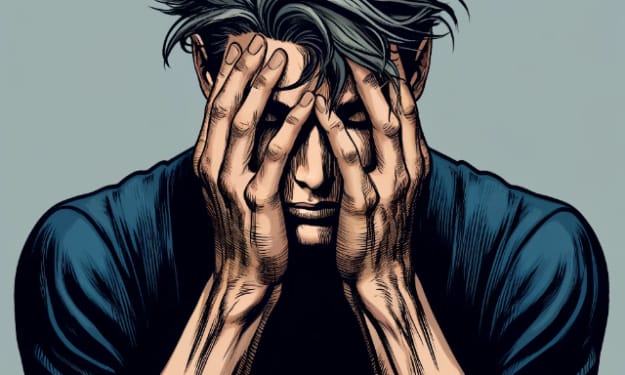Cutting the Red Tape: Understanding the Connection Between Depression and Addiction
This article highlights the often-overlooked link between addiction and depression. It argues against the practice of prioritising addiction over mental health in treatment protocols and calls for a more empathetic approach to support those struggling. Through personal stories and reflections, it urges professionals to see beyond labels and embrace compassion in addressing these complex issues.

Depression, with its intricate web of emotions and experiences, manifests uniquely in each person it touches. Yet, amidst the complexity of symptoms, one crucial sign of depression often slips through the cracks: addiction and substance abuse. Growing up in a family in which addiction was seemingly woven into our DNA, I've come to understand how addiction can create a deceptive veil. Too often, I watched a concoction of parties, loud music, and substance abuse mask the silent suffering of loved ones' depression, tucking it away slyly under the guise of revelry.
“There are all kinds of addicts, I guess. We all have pain. And we all look for ways to make the pain go away.”
― Sherman Alexie
Alcoholism and its effects were spun into the fabric of my daily life. So I learned that deep depression frequently doesn't hold a sign up in the air with obvious signs and symptoms like overt sadness or withdrawal. It hides behind the smiling mouths of jokers whose closest friends had only seen them cry a handful of times. It sneaks itself into a tremor as undetectable as the flutter of a butterfly wing on the vocal cords of the loudest voice in the room. For many sufferers, the hidden nature of their depression is intentionally orchestrated. What's heartbreaking is that their relentless attempt to conceal their condition is often driven by sheer desperation to not succumb to it. Combined with a deep shame that they're finding things so hard.
A party is the perfect place to hide when you think about it. Things are loud and blurry. No one is really aware enough to realise if you took too many shots because you were caught up having fun or if it was because each drop numbed an aching heart. Some of the most vibrant souls I knew were secretly grappling with their inner demons, their pain stuffed behind a facade of laughter and liveliness. What a complicated paradox to witness: the life of the party, the centre of attention, secretly battling a darkness that few could perceive.
However, today, I don't want to talk about how depression can hide; all that we really need to know is that it often does. Instead, I want to highlight how, in healthcare, refusing to acknowledge how depression and addiction intertwine is affecting treatment outcomes. Leaving some of the most traumatised and vulnerable members of our society feeling hopeless and alone in their pursuit of recovery.
A Deadly Game of Chicken Vs. Egg
In 2020, during the height of the pandemic, I sat in a hospital waiting room with a family member who was suffering badly from addiction and depression. The depression had been there for many years, through his childhood, teens, and his entire adult life. The addiction was new, brought on by the lack of structure and the increase in turbulence that lockdowns provided.
He had been a party go-er and a binge drinker but never a daily drinker who was broken and powerless to his vices, like we had found that day. Yet still, after 6 hours, masked up in a busy hospital waiting room, a community alcohol nurse sent him away with little more than a phone number and some leaflets. Despite his entering the room in a mental health crisis, displaying an extensive and well-documented history of psychiatric struggles that ranged in severity and included previous attempts to take his own life.
Admitting that mental health is a struggle is a challenge for most sufferers, riddled with shame and feelings of inadequacy. So how, then, is someone in this situation supposed to deal with arriving at the healthcare setting they've been signposted to, shattered and in total surrender, only to be sent home with a phone number?
The response he received when he finally reached out for help was nothing more than another barrier to accessing treatment. People fighting depression daily just don't have the resilience to continually break down barriers to get the treatment they need. Why are our healthcare systems treating depression and mental health like a game of chicken vs. egg? Even if we could find a good enough answer, the answer shouldn't be a factor when planning treatment.
Depression and addiction need treating in tandem if we want patients to have any hope of proper recovery. Addiction is a symptom of poor mental health, very rarely the whole cause.
Too often, patients are met with a dismissive attitude that prioritises addressing their addiction over acknowledging their pre-existing mental health struggles. They are told to "get sober first, then we'll talk about your depression." But too many don't make it that far because the addiction is their current coping mechanism to deal with the depression in the first place. They succumb to their addiction or make the tragic decision to end their own life first because they can't cope without their only short-term crutch, even though they know it isn't a long-term solution.
This flawed approach fails to recognise the intricate relationship between addiction and depression. By focusing solely on treating the addiction, we overlook the underlying mental health issues that fuel it. It's like trying to extinguish a fire while ignoring the fuel source—a futile endeavour that only perpetuates the cycle of suffering.
Behind every "addict" lies a story of profound pain and resilience, obscured by the stigma and misconceptions that surround addiction and mental illness. They are not just "junkies" or "alcoholics"—they are human beings deserving of compassion and understanding. Yet, all too often, they are reduced to nothing more than their addiction, their humanity overshadowed by societal judgment and prejudice.
Improving Outcomes of the Future: What Can Healthcare Systems Do Differently?
Sadly, the family member I mentioned earlier met the fate I described. He took his own life in late December after his addiction, which was fuelled by his depression, had rampaged his life. Leaving him with no sight of another way out. He passed away with a letter for community alcohol services, delivered that day, unopened on the hallway floor.
The paramedic who arrived at the scene described substance abuse disorders as a "red tape" to those seeking treatment for their mental health. I'll always feel a deep anger that the desperate pleas he made in his weakest moments went utterly unanswered because of his addiction. When his addiction should have been a glaring red flag, showing just how severe his depression was and how much he needed help. He was an addict, but he also suffered from very real depressive episodes from such a young age that he simply couldn't cope with after years of strain. So he drank to numb the pain, which led to addiction. He was an addict, but before that, he was a brother, a father, and a friend. He was a person.
It's time for our healthcare systems to confront their biases and provide comprehensive support to those struggling with addiction and depression. We cannot continue turning a blind eye to the intertwined nature of these two afflictions. His story is not unique; it reflects a system that too often fails to see the person behind the diagnosis. He deserved better treatment outcomes, which, now for him, will sadly never become a reality. But many others are out there who still can and deserve to receive better care.
As we navigate the intricacies of mental health, let us not overlook the silent battles behind addiction's veil. Let us extend a hand of empathy and understanding to those struggling, recognising the profound humanity in every individual's journey. It's time to peel back the layers of stigma and judgment and embrace the complexity of depression with compassion and kindness. Only then can we truly heal the wounds that lie beneath.
If this topic interests you, I recommend taking a look at this. Dr. Bruce Alexander's "Rat Park" study offers a poignant reminder of the interplay between environment, addiction, and mental health. It challenges us to reevaluate our perceptions and extend empathy beyond labels. Addiction is not a moral failing or a lack of willpower—it's a symptom of more profound pain and trauma that deserves to be acknowledged and addressed with compassion and understanding.
Wishing you love, strength, and healing,
Rebekah
About the Creator
Rebekah Crawley
I talk about healing, mental health advocacy, personal development, the human mind, philosophy, spirituality, and more.
Thank you for being here 🤍
📬 Twitter: @rebekahhhc224






Comments (2)
Loved this. My condolences for your loss.
This was such an excellent read. I am so sorry for the loss of your family member. I think asking for help is so hard and when it’s dismissed or not taken seriously…. Anyway. This was a great article. Wishing you all the best.